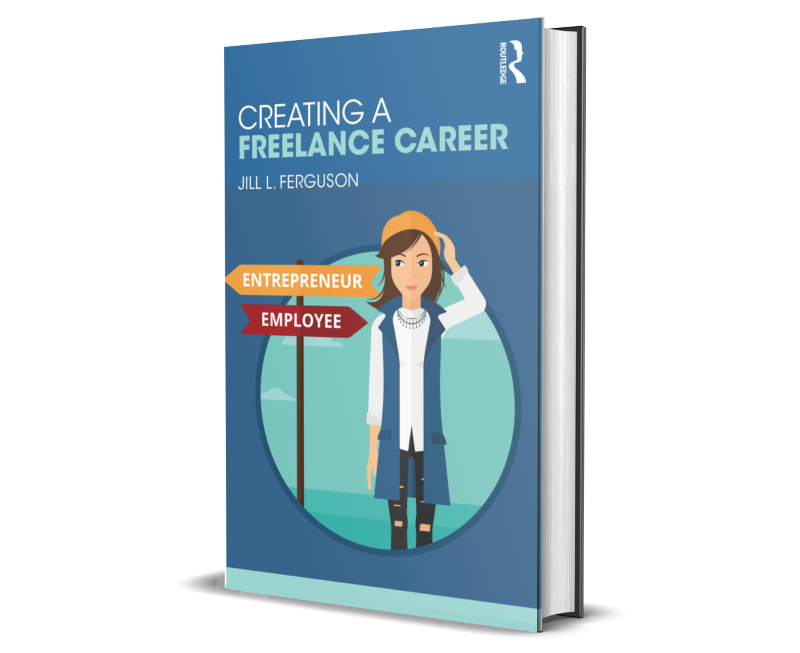|
The following information is a brief overview of one section of Creating a Freelance Career's Chapter Six, So You Want to Write a Book or Publish Other Things.
If you decide you want to pursue a traditional publishing route for the nonfiction book you are writing, you will need to put together a book proposal. to send to literary agents and/or publishers. A book proposal contains six essential parts: 1) Overview 2) Chapter by Chapter Outline 3) Marketing Analysis 4) Competitive Analysis 5) Sample Chapters 6) Author Bio We will explore these in depth in six blog entries, starting with the competitive analysis, as sometimes looking at the competition gives us ideas to focus on in our own writing; we can see gaps in knowledge and how we can differentiate ourselves. A competitive analysis is a bit how it sounds. We examine the books in our industry, ones that would compete for shelf space in traditional bookstores and in online bookseller's category classifications. A client I'm working with is writing a book about her life with Asperger's so let's use that as the example. Her book is nonfiction, a memoir, so that narrows down field of published books, meaning we rule out any books for parenting a child with Asperger's and maybe any books written from a psychological perspective (such as textbooks and manuals). The books that could be similar include:
For example, Look Me in the Eye: My Life with Asperger's by John Elder Robison (Three Rivers Press, 2008) humorously and painfully follows the author's childhood (where teachers and others labeled him "defective") to adulthood where he finally has a diagnosis, becomes a husband and a father and creates a successful business. Similarly, (INSERT BOOK TITLE) is a collection of true stories about my adventures and social faux pas while traveling around the world as a teenager and beyond in search of a place and a family where I fit in. How much competition your book may have will determine how many paragraphs of analysis you need in this part of your book proposal. And don't ever tell an agent or publisher that your book is so unique that has no competition. Choose the books that are closest and compare. The book proposal itself can be written as you're fleshing out your book outline and understanding its substance. For nonfiction books, you can start shopping for a literary agent or a publisher once you have a clear idea of the book, its contents, and some of the writing done. The whole book does not need to be complete at that time, as the agent or publisher may have some opinions as to what contents are found in the final product. Next week, we will explore marketing analysis. In the meantime, if you have questions about book proposals, please feel free to comment below or e-mail.
Click to set custom HTML
Click to set custom HTML
0 Comments
 When Sometimes Art Can't Dave You came out, I went on a book tour that took me through northern California, Oregon, Washington, New York City,Minneapolis-St Paul, Indianapolis, and to St. Louis, places my publicist assured me, people were still buying books. :) The tour was great fun. I was on radio shows in the U.S. and Canada. I was on television in most of the places I visited. I recorded podcasts. And I read excerpts and signed books in bookstores. I met some amazing people that to this day, 11 and 12 years later, I call good friends. I even ended up briefly with a stalker while on tour. But the thing no one tells you when you're doing this publicity (besides the whole don't say under your own name at the hotel part so would-be stalkers don't find you) is that book sales may only increase just a little bit and that, depending on your book's subject matter, many people may call into shows to talk to you but those same people may not appear at the public readings. In fact, very few people may show up at the readings. I'm part of an international group of women writers secret FB group, and time and time again when we discuss book marketing, the poorly attended book readings and signings become topics of discussion. A lot of publicity has to go into bringing people out to readings and even then there's no guarantee of an audience since so many other things vie for people's attention and we all have so many other time commitments. Blogging, social media campaigning, getting a following on Amazon's Author Central and Goodreads are all key to getting word out about readings and signings. Also, taking part in new media ideas, like the Virtual Book Tour and Writer of the Week program by Universal by Design, is another way to do readings and have audiences find you by literally coming to you (instead of you touring to them). I read from Creating a Freelance Career last Friday on the Virtual Book Tour, and it was great fun to work with Melissa of Universal by Design/ Melissa is in Norway and I'm in California, but modern technology makes distance irrelevant, and it helps us reach readers wherever they are, too. So before yo consider spending lots of money on a book tour (sorry, publishing companies aren't shelling out for this much anymore unless you're a big-name writer), consider ways you can read and reach readers through social media, through podcasts and virtual tours, through YouTube and your own websites, and through your local community, which is ripe with venues and opportunities...and like the theme song of the old television show Cheers says, "Everybody knows your name."  I got an unexpected gift over the weekend. The editor Routledge/Taylor & Francis hired to copy edit Creating A Freelance Career endorsed me on LinkedIn and reviewed the book in doing so. This is what Kelly Derrick wrote: "I recently copy-edited Jill's upcoming book, Creating a Freelance Career. Jill is a joy to work with and her book is essential reading for anyone considering a freelance career or indeed already working as a freelancer. As a freelance editor myself I found the book extremely user-friendly, relevant and packed full of everything you need to know about creating and maintaining a freelance career with advice on just starting out, marketing, networking, building your business and brand, making sense of contracts, sustaining and expanding your business and lots more. The book includes really useful resources and links to professional organisations and associations that are invaluable to any aspiring freelancer and also includes inspirational case studies of successful freelance entrepreneurs." Kelly and I have never met. She lives in the U.K. and I live in the States. We have e-mailed back and forth over the past two weeks in regards to my book. And when she finished the edits, I introduced her to some of the women's networking groups related to publishing in which I participate, and I wrote her an endorsement on LinkedIn, too. I believe in promoting others who do outstanding work and in helping people achieve their dreams. And I'm grateful for this unexpected gift of a book review two and a half months before the book is released. Thank you, Kelly. |
AuthorJill L. Ferguson Archives
October 2025
Categories |

 RSS Feed
RSS Feed